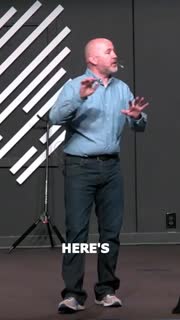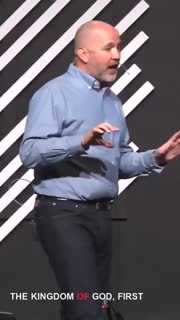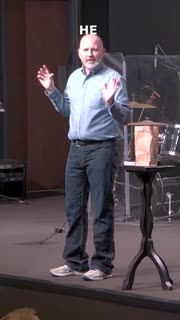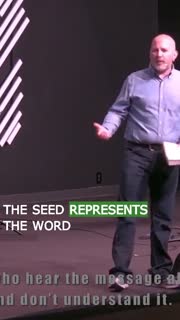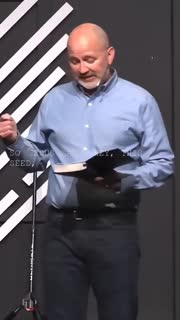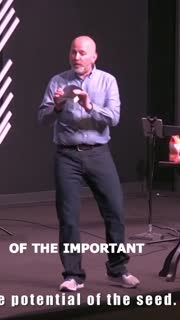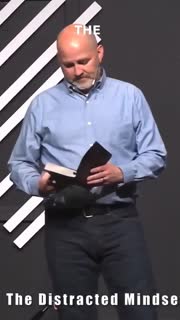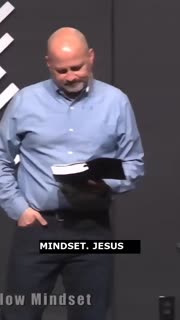Embracing the Word: Cultivating a Fruitful Mindset
Devotional
Sermon Summary
Bible Study Guide
Sermon Clips
### Quotes for Outreach
1. "Here's my challenge for you this summer. As we move into July and into the month of August, I want to double dog dare you to read the Gospels this summer. Now, if you're like, okay, the Gospels, you got to give me more information. The Bible is divided into two parts. The majority of the Bible in most of our Bibles that we look at are what we call the Jewish Scriptures, the Old Testament. Sometimes we call Covenant, and then there's the New Covenant or the New Testament, and the beginning of the New Testament are the four Gospels, and just to explain these real quickly because sometimes, again, we're intimidated by all this. The Gospels are simply accounts of Jesus' life and ministry, so if you want to get to know Jesus better, maybe you've recently made a commitment to follow Jesus, and you're like, okay, I want to get to know this person that I'm following, or maybe for you, you're not even there yet. Like, you're kicking the tires. You're trying to figure out what you believe about God and the Bible and Jesus and all those types of things. Even for you, I want to challenge you to read the Gospels." [33:24] (66 seconds)
2. "The kingdom of God, first of all, a kingdom. Think about an earthly kingdom. So think about a king ruling over a domain, right? Like, first of all, if you think about a kingdom, the most important part of the kingdom is the king, right? In fact, a kingdom without a king is dumb, right? D-O-M, right? Dumb. And so you've got it, the king is the most important part of the kingdom. So when we think about the kingdom of God, the very first thing that we think of is the presence of God, right? So the kingdom of God is wherever the king is, wherever his presence is. But on top of that, maybe think of the kingdom of God in this way. It's the rule and the reign of God." [37:12] (44 seconds)
3. "He really does love you. He really does care about you flourishing and being fruitful and being fulfilled. And so, in the kingdom of God, it's about us going, God, I want your presence, and I want you to rule and reign in my life. I want you to call the shots. Whatever you want me to do, I want to say yes to you and to your kingdom, right?" [40:04] (21 seconds)
4. "I promise you that you will fall in love with Jesus more and more, and I think sometimes like we get so like, you know, we get so into the weeds of religion, and denomination, and pastors, and but biblical author, or not biblical authors, but modern day authors, and all this stuff. Sometimes it's good just to, let's just go back to Jesus, and to see who he is, and what he had to say, and why he had to say that." [36:00] (26 seconds)
5. "The seed represents the Word of God, the message of the kingdom of God. And Jesus says, you know, this message is scattered. This message is broadcast, and some people hear it, but they don't really hear it. And so Jesus says, some people hear it, and other people hear it, and they lean in, and they become curious, and they begin to seek out what is the meaning of it." [44:02] (24 seconds)
### Quotes for Members
1. "So Jesus says, hey, this seed, it represents those who hear, but they're not really hearing. Right? They're listening, but they're not really listening. And the evil one comes and snatches away the seed that was planted in their hearts, and it's as if that conversation never even happened. And we've all, unfortunately, experienced that in our human relationships. The same is true in our relationship with our Heavenly Father. And so He wants to say to us through His Word, and we read it, but we don't really read it. Have you ever had a moment maybe where you've been reading Scripture, you've been a good little Christian, you're doing your Scripture reading, and like 15 minutes later after you closed your Bible, you're like, what did I even read today? Like, I don't even remember what I read. What is that? I was reading, but I wasn't really reading. I wasn't really paying attention." [45:18] (52 seconds)
2. "I think one of the important things of having a fruitful mindset is understanding the potential of God's Word. That when we see God's Word, we don't just see it as a book. We see it as, man, this is God's Word, and it has the potential, if I will allow it, to change me. I remember it was a number of years ago that I kind of had a switch. So many years I would read God's Word, but I was reading God's Word for information instead of reading God's Word for transformation. I was reading God's Word so I could know a lot about the Bible, maybe do really good in Bible trivia, maybe allow pride to well up and, oh, I know more about the Bible than this person knows about the Bible. Can I tell you, that is exactly the worst way to read the Bible. We don't read the Bible primarily for information. We read the Bible primarily for transformation. I want this book to change me. I need this book to change me. My wife needs this book to change me. My kids need this book to change me. This church, you are hoping that this book is changing you. You are hoping that this book is changing you. You are changing me, right?" [55:31] (74 seconds)
3. "The purpose of the seed, listen, the purpose of God's word is not just for me to read it and for me. You know, all over it and chew it up. The purpose, the purpose is for me to share God's word. How do I share God's word? Well, by living it out, by doing it, right? James says, don't just be hearers of the word, but be doers of the word. One of the ways that I meditate on God's word is I begin to, okay, how can I put this into action? How do I need to pray differently? How do I need to act differently? What, what, what are the adjustments that I need to make in my life?" [01:08:06] (33 seconds)
4. "The distracted mindset is a mindset of our age, of our time. Finally, we have number four, the fruitful mindset. Jesus says in verse 23, the seed that fell on good soil represents those who truly hear and understand God's Word. Again, in the Greek, it's about wanting to hear and understand. It's about seeking to hear and understand. They truly, they seek to hear and understand God's Word, and they produce a harvest of 30, 60, or even 100 times as much as has been planted. And here's what I know to be true about you, because I know it's true of me. Like, I want my life to count. I want my life to matter. I don't want to get to the end of my life, and for her to have that thought of, what a waste." [49:39] (47 seconds)
5. "So Jesus says this in verse 20. He says, the seed on the rocky soil represents those who hear the message and immediately receive it with joy, but since they don't have deep roots, they don't last long. They fall away as soon as they have problems or are persecuted for believing God's word. So this seed is not like the first soil. It actually makes its way into the soil. It takes root. It springs up, but immediately it wilts and it dies because of the presence of rocks underneath the surface of the soil. They receive the message with joy. There's great enthusiasm. Maybe there's great emotion. Maybe there's even, tears, you know, like, and, oh, I finally have clarity in my life. I finally have purpose. I finally understand. Like, my eyes are finally open, but because of the presence of problems or persecution, they immediately wilt. At the first sign of opposition, they drop out." [46:43] (62 seconds)
Ask a question about this sermon
1. "Here's my challenge for you this summer. As we move into July and into the month of August, I want to double dog dare you to read the Gospels this summer. Now, if you're like, okay, the Gospels, you got to give me more information. The Bible is divided into two parts. The majority of the Bible in most of our Bibles that we look at are what we call the Jewish Scriptures, the Old Testament. Sometimes we call Covenant, and then there's the New Covenant or the New Testament, and the beginning of the New Testament are the four Gospels, and just to explain these real quickly because sometimes, again, we're intimidated by all this. The Gospels are simply accounts of Jesus' life and ministry, so if you want to get to know Jesus better, maybe you've recently made a commitment to follow Jesus, and you're like, okay, I want to get to know this person that I'm following, or maybe for you, you're not even there yet. Like, you're kicking the tires. You're trying to figure out what you believe about God and the Bible and Jesus and all those types of things. Even for you, I want to challenge you to read the Gospels." [33:24] (66 seconds)
2. "The kingdom of God, first of all, a kingdom. Think about an earthly kingdom. So think about a king ruling over a domain, right? Like, first of all, if you think about a kingdom, the most important part of the kingdom is the king, right? In fact, a kingdom without a king is dumb, right? D-O-M, right? Dumb. And so you've got it, the king is the most important part of the kingdom. So when we think about the kingdom of God, the very first thing that we think of is the presence of God, right? So the kingdom of God is wherever the king is, wherever his presence is. But on top of that, maybe think of the kingdom of God in this way. It's the rule and the reign of God." [37:12] (44 seconds)
3. "He really does love you. He really does care about you flourishing and being fruitful and being fulfilled. And so, in the kingdom of God, it's about us going, God, I want your presence, and I want you to rule and reign in my life. I want you to call the shots. Whatever you want me to do, I want to say yes to you and to your kingdom, right?" [40:04] (21 seconds)
4. "I promise you that you will fall in love with Jesus more and more, and I think sometimes like we get so like, you know, we get so into the weeds of religion, and denomination, and pastors, and but biblical author, or not biblical authors, but modern day authors, and all this stuff. Sometimes it's good just to, let's just go back to Jesus, and to see who he is, and what he had to say, and why he had to say that." [36:00] (26 seconds)
5. "The seed represents the Word of God, the message of the kingdom of God. And Jesus says, you know, this message is scattered. This message is broadcast, and some people hear it, but they don't really hear it. And so Jesus says, some people hear it, and other people hear it, and they lean in, and they become curious, and they begin to seek out what is the meaning of it." [44:02] (24 seconds)
### Quotes for Members
1. "So Jesus says, hey, this seed, it represents those who hear, but they're not really hearing. Right? They're listening, but they're not really listening. And the evil one comes and snatches away the seed that was planted in their hearts, and it's as if that conversation never even happened. And we've all, unfortunately, experienced that in our human relationships. The same is true in our relationship with our Heavenly Father. And so He wants to say to us through His Word, and we read it, but we don't really read it. Have you ever had a moment maybe where you've been reading Scripture, you've been a good little Christian, you're doing your Scripture reading, and like 15 minutes later after you closed your Bible, you're like, what did I even read today? Like, I don't even remember what I read. What is that? I was reading, but I wasn't really reading. I wasn't really paying attention." [45:18] (52 seconds)
2. "I think one of the important things of having a fruitful mindset is understanding the potential of God's Word. That when we see God's Word, we don't just see it as a book. We see it as, man, this is God's Word, and it has the potential, if I will allow it, to change me. I remember it was a number of years ago that I kind of had a switch. So many years I would read God's Word, but I was reading God's Word for information instead of reading God's Word for transformation. I was reading God's Word so I could know a lot about the Bible, maybe do really good in Bible trivia, maybe allow pride to well up and, oh, I know more about the Bible than this person knows about the Bible. Can I tell you, that is exactly the worst way to read the Bible. We don't read the Bible primarily for information. We read the Bible primarily for transformation. I want this book to change me. I need this book to change me. My wife needs this book to change me. My kids need this book to change me. This church, you are hoping that this book is changing you. You are hoping that this book is changing you. You are changing me, right?" [55:31] (74 seconds)
3. "The purpose of the seed, listen, the purpose of God's word is not just for me to read it and for me. You know, all over it and chew it up. The purpose, the purpose is for me to share God's word. How do I share God's word? Well, by living it out, by doing it, right? James says, don't just be hearers of the word, but be doers of the word. One of the ways that I meditate on God's word is I begin to, okay, how can I put this into action? How do I need to pray differently? How do I need to act differently? What, what, what are the adjustments that I need to make in my life?" [01:08:06] (33 seconds)
4. "The distracted mindset is a mindset of our age, of our time. Finally, we have number four, the fruitful mindset. Jesus says in verse 23, the seed that fell on good soil represents those who truly hear and understand God's Word. Again, in the Greek, it's about wanting to hear and understand. It's about seeking to hear and understand. They truly, they seek to hear and understand God's Word, and they produce a harvest of 30, 60, or even 100 times as much as has been planted. And here's what I know to be true about you, because I know it's true of me. Like, I want my life to count. I want my life to matter. I don't want to get to the end of my life, and for her to have that thought of, what a waste." [49:39] (47 seconds)
5. "So Jesus says this in verse 20. He says, the seed on the rocky soil represents those who hear the message and immediately receive it with joy, but since they don't have deep roots, they don't last long. They fall away as soon as they have problems or are persecuted for believing God's word. So this seed is not like the first soil. It actually makes its way into the soil. It takes root. It springs up, but immediately it wilts and it dies because of the presence of rocks underneath the surface of the soil. They receive the message with joy. There's great enthusiasm. Maybe there's great emotion. Maybe there's even, tears, you know, like, and, oh, I finally have clarity in my life. I finally have purpose. I finally understand. Like, my eyes are finally open, but because of the presence of problems or persecution, they immediately wilt. At the first sign of opposition, they drop out." [46:43] (62 seconds)
